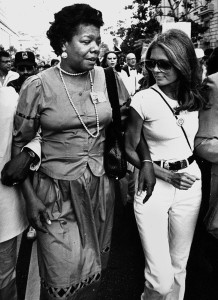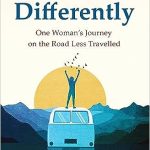Get ready to take a great ride with writer, political activist and social organizer Gloria Steinem in her new memoir, My Life on the Road. In it she gives an up close and personal account of her “lifetime of travel, activism and leadership,” and a profound story of her growth over the course of her life (which to date, is 81 years!), and “the growth of a revolutionary movement for equality.”
Why Gloria Steinem Wrote This Book
Steinem writes, “I am writing this on-the-road-in-America book because it’s the place I live and travel most, and most need to understand, especially given its outsize influence on the world. Also I am not sure we can understand another country if we don’t understand our own.”
She states upfront how she wants to share the “most important, longest-running, yet least visible” parts of her life, which she does in spades. Steinem also aspires to encourage us to spend time on the road — not literally, but to approach each day with an “on-the-road” state of mind. And she wants to share stories, with the hope that it will lead us to tell our own, which includes getting “hooked on the revolutionary act of listening to others.”
A Traveling Organizer
 In My Life on the Road, we learn so much about the life of this amazing woman. In captivating detail, we see just how she became a “traveling organizer,” which, as she writes, means “being an entrepreneur of social change.” From her life as a girl, why she does not drive, to how her exposure to social activism in India influenced her and the many ways in which the “political is personal,” Steinem lets us into many corners of her life and passions.
In My Life on the Road, we learn so much about the life of this amazing woman. In captivating detail, we see just how she became a “traveling organizer,” which, as she writes, means “being an entrepreneur of social change.” From her life as a girl, why she does not drive, to how her exposure to social activism in India influenced her and the many ways in which the “political is personal,” Steinem lets us into many corners of her life and passions.
We also get inside her history of working on political campaigns, and how it has had three stages in her life — the third of which started in her 60s! In vivid detail, we see how and why she has been “inspired, angry, exhausted, educated, energized, despairing, and impatient – but never sorry” about her dedicated citizen campaigning work.
Powerful Women
Then there’s discussion of politicians. We get to see Hillary Clinton through Steinem’s eyes and experience, and better understand motives behind “Hillary Haters.” Steinem gives a candid account of how she came to decide who to support for president the first time Hillary ran, and what led her to write the infamous 2008 New York Times op-ed titled, “A Short History of Change” (which the New York Times changed to “Women are Never Front-Runners”).
Steinem also lets us in on the lives of other powerful woman activists she has worked with over the years, such as Flo Kennedy and Margaret Sloan. One cool story involves how this sentence came to be on scads of t-shirts, political buttons, clinic walls and protest banners: “Honey, if men could get pregnant, abortion would be a sacrament!” We also get inside the conflict Steinem had with Betty Friedan, who thought “Flo Kennedy, Kate Millett, Robin Morgan and others” were “disruptors of the women’s movement.”
Sage Nuggets
Amidst the many riveting stories, sage nugget quotes sprinkle throughout. A few of my favorites include:
“The road is messy in the way that real life is messy. It leads us out of denial and into reality, out of theory and into practice, out of caution and into action, out of statistics and into stories—in short, out of our heads and into our hearts.”
“In truth, we don’t know which of our acts in the present will shape the future. But we have to behave as if everything we do matters. Because it might.”
“The simple right to reproductive freedom – to sexuality as an expression that is separate from reproduction-is basic to restoring women’s power, the balance between women and men, and a balance between humans and nature.”
And she gives us nuggets from others, like this one from a 98-year-old Ziegfeld girl who was “on her way to dance in an AIDS benefits on Broadway with her 101-year-old friend from chorus girl days” when Gloria struck up a conversation with her on a plane: “You’re always the person you were when were born…you just keep finding new ways to express it.”
Wisdom of Native Peoples
As we come around a final bend in this ride with her, Steinem shows us how we have a lot to learn from Native peoples about the structure and balance of power in societies. We find out a lot about Wilma Mankiller, the first woman ever elected principal chief in modern times of the Cherokee Nation, and Steinem’s deep friendship with her until her death.
In My Life on the Road, Steinem lets us in to more intimately know and learn from her. She endures as a remarkable social change agent, and at the core, a writer who feels “there is no better moment in life than finding the right word.”
Don’t miss this excellent read about one of the most important women of our time.


